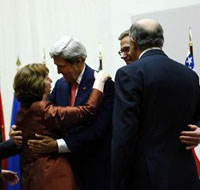25 Nov 2013 - {{hitsCtrl.values.hits}}
 Iran on curbing its nuclear program but he and other global leaders now have tough work ahead turning an interim accord into a comprehensive agreement.
Iran on curbing its nuclear program but he and other global leaders now have tough work ahead turning an interim accord into a comprehensive agreement.
26 Dec 2024 3 hours ago
26 Dec 2024 4 hours ago
26 Dec 2024 5 hours ago
26 Dec 2024 6 hours ago
26 Dec 2024 7 hours ago